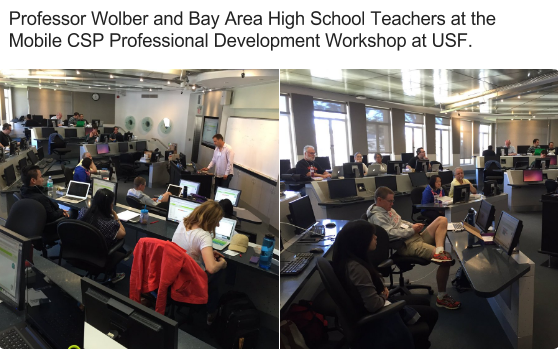 Democratize Computing Lab
Democratize Computing Lab
Broadening and Diversifying Tech
 Democratize Computing Lab
Democratize Computing Lab Broadening and Diversifying Tech
Software development is restricted to the digital elite, the .001% of the world who know how to program; most don't even dream of participating in the mysterious world of code. The DCL's mission is to to break down the "programmer divide", and radically broaden and diversify the pool of software creators. Our approach is based on App Inventor, a tool that allows absolute beginners to learn programming by building mobile apps for phones and tablets. App Inventor both heightens motivation (it's really fun!) and lowers the barriers to learning, thus providing a welcome introduction to designers, artists, women, people of color, scientists, health professionals, humanities majors, entrepreneurs-- anyone who desires to add software to their creative problem solving arsenal. Our end-goal is two-fold: to empower people to thrive in today's increasingly digital society, and to infuse the software development field with creative, big-picture thinkers.
DCL Co-Director David Wolber is a leader in CS education involving MIT App Inventor, a visual blocks language that allows beginners to learn coding by programming their phones and tablets.
Wolber and USF CS students run appinventor.org, an educational site that has helped thousands learn coding by building apps for phones and tablets. The site reaches about 60,000 unique visitors a month, including self-directed students as well as K-12 and university teachers, many of whom make use of the site’s “Course-in-a-Box”.
Wolber is lead author of the popular book, App Inventor: Create your own Android Apps, which he wrote with the creator of App Inventor, MIT Professor Hal Abelson, and two Google engineers, Ellen Spertus and Liz Looney.
The appinventor.org work has been funded by grants from the National Science Foundation and the W.M. Keck Foundation.
Besides developing educational materials for App Inventor, the DCL also programs! Professor Wolber and students contribute to the development of the App Inventor tool itself, collaborating directly with the MIT App Inventor development team.
The team is responsible for the App Inventor Community Gallery, which allows app developers to share their apps in an open-source learning environment.
The team is also working on an extension, the Java Bridge, that allows App Inventor programmers to view the Java code equivalent for any app they build.
The DCL is helping Bay Area middle and high-schools offer some of their first computer science courses. The DCL runs a Google-funded summer workshop for high school teachers and led by DCL Co-Directors Alark Joshi and David Wolber. This year’s workshop focused on the new Advanced Placement (AP) course in Computer Science Principles (CSP), and the teaching of the Mobile CSP curriculum (mobile-csp.org, which Professor Wolber helped create).
In order to facilitate a community of practice, the DCL also coordinates a program supporting teachers during the school year, including USF CS students going into the community to assist teachers at the local schools.
The DCL works closely with the San Francisco Unified School District (SFUSD) and is proud to contribute to their amazing CS FOR ALL program which has almost over-night added computer science throughout the curriculum. The DCL has also contributed to a new app building module for San Francisco middle schools.

Girl Tech Power is a one-week summer code camp for middle school and high school girls. Under the Direction of DCL Co-Director Alark Joshi, USF students teach the girls lessons on the basics of HTML, coding with Python and App Inventor, and computer architecture. The goal is to introduce computer science to girls at a young age and empower them to break stereotypes and join the tech field. The camp is held over 5 days in the summer and we host around 50 girls with workshops for HTML, Alice, Scratch, Python, and Computer Architecture. The middle and high school girls are split into two groups during lectures to provide the appropriate level of difficulty for grade level. To cap off the week-long camp, we take the girls on a trip to a local Bay Area tech company and introduce them to some female engineers to give them a peek of what their lives in tech would look like. We also give the girls time to take the knowledge they have acquired during the workshops to create a project of their choice using Python, HTML, Scratch, Alice, or AppInventor.